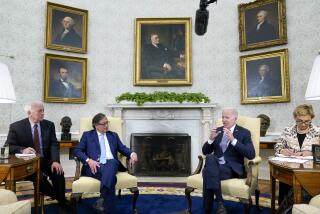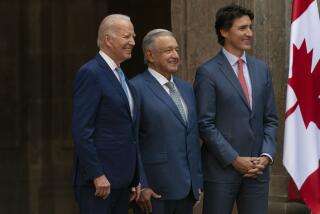Brazil Gets Reagan Pledge on Latin Peace : No U.S. Military Effort in Nicaragua, President-Elect Is Assured
WASHINGTON — President Reagan assured President-elect Tancredo Neves of Brazil on Friday that the United States does not intend to use military force against Nicaragua and supports Latin American mediation efforts in Central America.
Brazilian diplomats traveling with Neves told reporters of Reagan’s assurances on Central America and said they were well received by Neves, who supports the so-called Contadora mediation effort to pacify Central America. The effort is being led by Mexico, Venezuela, Colombia and Panama.
No details of what Reagan said were made public.
Neves, elected Jan. 15 by an electoral college, leaves here Sunday for a meeting with President Miguel de la Madrid of Mexico. He has already been to Western Europe, where he met with Pope John Paul II, President Francois Mitterrand of France, Prime Ministers Felipe Gonzalez of Spain and Mario Soares of Portugal and Foreign Minister Giulio Andreotti of Italy. His trip will end with a visit to President Raul Alfonsin of Argentina.
Key Part of Trip
Neves said on arrival here that the most important part of his trip, in preparation for taking office March 15, would be the meetings with leaders of the Reagan Administration and Congress.
Brazil is the largest debtor among developing countries, with a foreign debt of more than $100 billion. Most of this is held by U.S. banks, which are negotiating now on refinancing, over a 15-year period, of $45 billion in debts coming due from this year until 1990.
An agreement on refinancing the debt has been delayed by rampant inflation in Brazil, where prices went up 225% last year. Brazil has failed to keep control of public deficits, in violation of an agreement with the International Monetary Fund.
Neves has said that he will abide by an agreement on debt refinancing reached by the present Brazilian administration with the banks. President Joao Figueiredo, the last of five army generals who have successively governed Brazil since a military coup in 1964 overthrew the last elected government, now has little more than a month in office to complete the negotiations with the banks.
In a speech Friday at the National Press Club outlining his program as president, Neves said, “An immediate improvement in the standard of living of the Brazilian population is indispensable” after four years of economic recession.
Standard of Living Vital
He promised to fight inflation by trimming public deficits and stepping up agricultural production, revitalize consumer goods industries and promote small public works to reduce unemployment.
He said high interest rates, which have pushed Brazilian debt payments as high as $14 billion a year just to pay interest, are “inhibiting investment in Brazil and other developing countries.” He said he would encourage “a significant inflow of risk and financial capital” by foreign investors interested in developing Brazil’s huge natural resources.
The Brazilian visitor’s day began with a one-hour breakfast meeting with Secretary of State George P. Shultz, Defense Secretary Caspar W. Weinberger, Commerce Secretary Malcolm Baldrige and special trade representative William E. Brock.
Cites ‘Common Destiny’
In all his meetings here, Neves is reported to have indicated that Brazil is open to a constructive relationship with the United States based on his premise that the two countries have a “common destiny” for defending democracy in Latin America.
Neves said after his 25-minute White House meeting with Reagan that Brazil is “the best friend of the United States in Latin America and perhaps in the world.”
He said at a press conference that the United States and Brazil, Latin America’s largest country, could be the “two pillars” for maintaining democracy in Latin America if they cooperate politically and economically.
“Anything that is done by the United States to help Brazil’s economy and democratic development is good for the United States,” Neves said.
More to Read
Sign up for Essential California
The most important California stories and recommendations in your inbox every morning.
You may occasionally receive promotional content from the Los Angeles Times.










